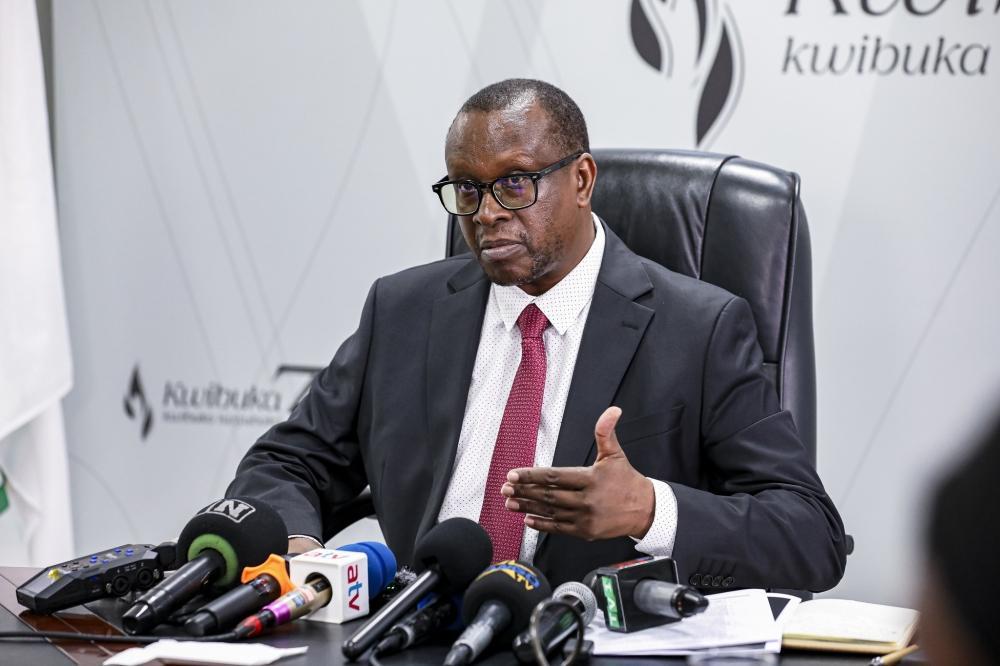Africa-Press – Rwanda. The Minister of National Unity and Civic Engagement, Jean-Damascène Bizimana, has criticized former BBC journalist Ally Yusuf Mugenzi, accusing him of aligning with long-standing denialist narratives about he 1994 Genocide against the Tutsi.
According to Bizimana, Mugenzi’s social media attacks on his speeches about the history of the Genocide are attampts to conceal the retired radio host’s past associations with people and groups who perpetrated the massacre and devised a plan to deny it from DR Congo using BBC and Voice of America (VOA) journalists who worked for the broadcasters’ Kinyarwanda and Kirundi channels.
In a detailed post on X, Bizimana said that Mugenzi’s attempts to discredit him stem from a critical document that expose a wider post-genocide plan to deny the Genocide by the members of the Rwandan genocidal government and the former Rwandan army (ex-FAR).
The document in question is a minutes of an October 3, 1996 meeting held by the genocidal machine, the Minister said, and it reveals how they strategically worked to infiltrate international institutions and media platforms to distort historical truth and frame the Rwandan Patriotic Front (RPF) as having committed another genoide, what is known as the “double genocide” narrative.
“The main reason Mugenzi insults me is because I exposed a document from the genocidal regime in exile in Congo and its military wing, the ex-FAR, which details their long-term strategy to deny the genocide and spread false accusations about the RPF,” Bizimana said.
The 1996 meeting chaired by Lt Col Juvénal Bahufite in Bulonge in eastern DR Congo brought together key figures of the ex-FAR and members of the genocidal government in exile, leading to the creation of the RDR, a political party that which eventually morphed into the FDLR militia that is still active in DR Congo.
“The minutes of that meeting outline plans to infiltrate the Arusha-based UN Tribunal, secure employment within international institutions, and co-opt Rwandan extremist journalists working for foreign media, among them Mugenzi, to mislead global opinion, deny the Genocide against the Tutsi, and blame the RPF for fabricated atrocities,” Bizimana said
He said that four journalists were identified in the document as key players in this disinformation campaign: Mugenzi, Étienne Karekezi, Augustin Hatari, and Phocas Fashaho. Hatari and Fashaho were eventually dismissed by the VOA.
“Mugenzi became a messenger of this evil strategy, which is why he is uncomfortable with the truth coming to light. His actions today reflect the shame and burden of that hidden past,” Bizimana added.
He added that for years Mugenzi used the Imvo n’Imvano current affairs programme on BBC Gahuzamiryango to propagate distorted narratives about Genocide against the Tutsi.
Mugenzi, who worked for the BBC for 27 years before retiring in 2023, has long been criticized by genocide survivors and scholars for hosting guests and debates on sensitive historical matters without sufficiently challenging deniers.
Regarding the history of Lt Col Bahufite, the minister said, he led killings of Tutsi in several communes of the former Gisenyi and Byumba prefectures between 1990 and 1994.
After the defeat of the genocidal regime by the RPF, Bahufite reportedly continued committing killings in Congo. His daughter, Liliane Bahufite, now lives in Belgium and is a known member of JAMBO ASBL, an organization criticized for minimizing the Genocide against the Tutsi.
“This ideological line is being pushed forward by people like Mugenzi and Bahufite’s daughter. They inherited not only the mindset but the mission to rewrite history and sanitize the crimes of the genocidal regime,” Bizimana stated.
The Minister’s statements come at a time when Rwanda is marking the 31st commemoration of the 1994 Genocide against the Tutsi, a period during which calls to combat genocide denialism and revisionism have gained momentum.
For More News And Analysis About Rwanda Follow Africa-Press






